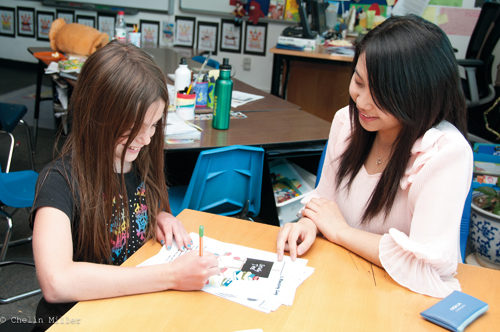
The following article is excerpted from beijingkids Home and Relocation Guide 2011. Download a PDF copy here or visit this page to order a free print copy for home delivery.
“Chinese is easy to forget, and hard to learn,” jokes Julia Huang, a teacher at Mandarin Express in Shunyi. Many foreigners who move to Beijing consider the daunting task of learning the language – and a good number of them commit to hours of studying. Sadly, all of those language-acquiring efforts are often worth nought once you’ve spent six months away from China. But after finally getting those tones down, who wants their language skills to go to waste?
Angela Snowball and her family studied Mandarin for three years while they lived in Beijing. After moving back to their native Australia six months ago, they’ve discovered just how challenging it is to keep it up.
“I guess that was to be expected when we’re not immersed in it anymore” says Snowball. “I took my eldest son (aged 4) to a Saturday morning Chinese school when we first returned, but that has come to a crashing halt since the new baby was born.”
Still, Snowball does her best to maintain her Mandarin. She has a Chinese student who comes to her house twice a week to look after her kids. They all try and switch to Chinese while the student is there, but it is hard. While their comprehension is good, Snowball’s boys are starting to forget some of their vocabulary.
While living in China, fellow Australian expat and ex-Beijinger Sonia Cahill put her 7-year-old daughter in a bilingual school for over two years, while her 4-year-old was in a Chinese kindergarten for two years. Before leaving Beijing, Cahill bought a stack of Mandarin resources from Xinhua Bookstore in The Place to keep her children connected to the language back in their home country. Her efforts seem to have worked, “The kids read these books quite often,” says Cahill.
Ever determined, Cahill researched a number of options in Australia to keep the Chinese language alive for all of them, especially her children. In addition to staying in contact with their ayi from Beijing by Skype and email, she has also looked at getting a Chinese-speaking babysitter.
Cahill also considered a Saturday Chinese class for her 7-year-old, but decided against it. The class was very intense, with a heavy focus on homework and Cahill believed it would be too much pressure for her daughter.
It is generally harder for adults to keep up a second language. “I’ve failed miserably at continuing Mandarin so far!” admits Cahill. “I’ve adopted the approach that I’m happy to retain an interest in the language and culture, rather than progressing with the vocabulary and adding unnecessary pressure.”
Leaving China is a daunting experience. You need to strike a balance between holding onto the culture and language you tried so hard to immerse your family in, and adapting to your new location. “We’re still suffering the side effects of transition,” says Cahill. It’s okay to put Chinese on the backburner for a while, as you settle into your new home.
While maintaining your language skills is important, it should also be fun. “Don’t push the kids, or yourself,” says Huang. “Parents need to find fun things to do to make the whole family want to maintain their Chinese.” That way, learning Mandarin won’t seem so hard to learn, and forgetting it won’t be so easy.

teacher huang’s top 10 tips:
1. While in Beijing, the whole family should learn Chinese. That way, when the time comes to move, you’ll have someone to practice with. It’s also helpful to stay in contact with your friends from China, not just to stay connected but also to practice the language.
2. Have a Chinese day when you only speak Chinese. Members of the family who make it through the whole day can win a prize or get a reward.
3. Get your kids to act out plays in Chinese. This will help with their vocabulary and it will help you with your Chinese listening skills.
4. Kids love to play “pretend.” Get them to be the Chinese teacher and you can be the student.
5. Buy fun, interesting and interactive videos that teach Chinese.
6. Learn and play traditional Chinese games like mahjong or Chinese chess.
7. When in your next country, enroll your children in a Chinese language school or research which schools offer Chinese as part of their curriculum.
8. After you leave China, keep the culture alive by visiting Chinese markets and restaurants in your next country. You can even impress the fuwuyuan by ordering in Chinese.
9. Get a Chinese nanny or babysitter at least one day a week.
10. Plan holidays and return trips to China to touchbase with old friends and reacquaint yourselves with the language.
RESOURCES
Nciku.com
An online dictionary that allows you to draw characters to find their meaning – great if you don’t know traditional stroke order or pinyin. Provides lots of real-life examples of how to use words in sentences.
Chinesecharacterflashcards.com
A simple, easy to use program that is guaranteed to keep all of the characters you’ve learned cemented into your brain.
Mandarinakids.com
Sells DVDs and toys designed by a mom who is raising her kids to be trilingual (English, German and Mandarin). The products and recommendations are best for parents with babies or toddlers.
Xinhua Bookstore 新华书店
B/1 The Place, 9 Guanghua Lu, Chaoyang District 朝阳区光华路9号世贸天阶B1楼




